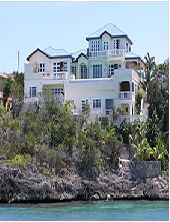Taxes are generally low
Rents: Can landlord and tenant freely agree rents in St. Vincent & Grenadines?
The initial rent can be freely agreed between the landlord and the tenant.
Deposits
The tenancy contract may stipulate a deposit, though it is not mandatory by law. The amount of deposit is usually one (1) month's rent.
What rights do landlords and tenants have in St. Vincent & Grenadines, especially as to duration of contract, and eviction?
The law in St. Vincent and the Grenadines generously protects the tenant. Premises may be rented without a written contract. An individual can make a contract for any duration, therefore no limit has to be fixed in the contract, whether for furnished or unfurnished premises. The contract can be for a period that is weekly, monthly or yearly. A document (lease) that creates or evidences a tenancy of real estate for more than one year has to be registered.
 The tenant may leave any time he wishes, subject to the terms of a written contract, if any, though the usual practice is that the tenant will give at least two (2) weeks to one (1) month's notice. If a deposit has been paid and the requisite agreed notice has not been given, the deposit may be forfeited.
The tenant may leave any time he wishes, subject to the terms of a written contract, if any, though the usual practice is that the tenant will give at least two (2) weeks to one (1) month's notice. If a deposit has been paid and the requisite agreed notice has not been given, the deposit may be forfeited.
No order or judgment for the recovery of possession of any premises or for the ejection of a tenant shall be made or given unless
- Some rent lawfully due from the tenant has not been paid for at least 30 days, or, in the case of a weekly tenant 15 days, after it has become due;
- Some other obligation of the tenancy (whether expressed or implied) has been broken or not performed and, in the case of the non-performance of any such obligation by the tenant, the tenant has been in default for at least 30 days;
- The tenant or any person residing or lodging with him or being his sub-tenant, has been guilty of conduct which is a nuisance or annoyance to adjoining occupiers or has been convicted of using the premises, or allowing the premises to be used, for an immoral or illegal purpose, or the condition of the premises has, in the opinion of the court, deteriorated or become unsanitary owing to acts of waste by, or the neglect or default of, the tenant or any such person, and where such person is a lodger or sub-tenant, the court is satisfied that the tenant has not, before the making or giving of the order or judgment, taken such steps as he ought reasonably to have taken for the removal of the lodger or sub-tenant;
- The tenant has given notice to quit, and, in consequence of that notice, the landlord has contracted to sell or let the dwelling house or has taken any other steps as a result of which he would, in the opinion of the court, be seriously prejudiced if he could not obtain possession;
- The premises being a dwelling house, are reasonably required by the landlord for occupation as a residence for himself or for some person wholly dependent upon him, or for any person bona fide residing, or to reside, with him, or for some person in his whole time employment;
- The premises, being building land, are reasonably required by the landlord for the erection of a building to be used as a dwelling house;
- The premises being a dwelling house are required for the purposes of being repaired, improved or rebuilt;
- The premises are required for public purposes;
- The tenant ha sub-let, or parted with the possession of, the whole or any part of the premises without either obtaining the consent of the landlord or being expressly authorized by or under the tenancy agreement or lease so to do;
- The tenant of a dwelling house uses the house or building mainly for business, trade or professional purposes without obtaining the consent of the landlord or being authorized by or under the tenancy agreement so to do;
- The tenant has been offered by the landlord in writing a new tenancy at a higher rent which is lawful, but otherwise on the same terms as the existing tenancy and has failed to accept such offer in writing within a reasonable time;
- Where the tenant is working for the landlord and the dwelling house is let on the condition that the tenancy shall subsist during such employment, or only until the expiration of a period not exceeding one month the employment is terminated; or
The Court will take into account having regard to all the circumstances of the case whether hardship will be caused by granting the order or judgment.
How effective is the St. Vincent & Grenadines legal system?
Tenancy law is enforced before the Courts, either through the Magistrate Courts or the High Court of Justice, depending on the monthly rent. If the rent payable is less than Eastern Caribbean One Thousand Two Hundred Dollars (EC$1,200.00) a year then a landlord's recourse to seek to evict a tenant and/or recover rent arrears is through the Magistrate Court.
If a tenant refuses to quit and deliver up peaceful possession of the premises, and the amount of rent payable is EC$1,200.00, the landlord or his agent may cause the person to be served with a written notice of his intention to proceed to recover possession through the Magistrate Court. Upon proof of service of the notice and of the neglect or refusal of the tenant or occupier to leave, the Magistrate may issue a warrant under his hand and seal, to the police officers and peace officers of the district where the premises are situate commanding them to enter by force if needed, within a certain period of time into the premises and give possession to the landlord or his agent. The period of time is to be not less than six (6) months from the date of granting the application for the warrant. The Magistrate may extend such period of six months to a period not exceeding a year if it is proved to his satisfaction that undue hardship will be created for the tenant, in that he cannot in the circumstances find alternative accommodation within the six months. A person cannot be evicted on a Sunday, Good Friday, Christmas Day or a public holiday. Evictions may only be made during 9:00 a.m. to 4:00 p.m.
 The landlord's recourse is through the High Court if the rent payable is more than EC$100.00 monthly and the landlord has determined the tenancy. When an application is filed in the High Court for recovery of possession of premises, the amount of additional time that the tenant has to vacate the premises is discretionary on the part of the Judge. The Judge may give one additional month or even up to six months. The Order made by the Judge is served on the tenant. If the tenant does not leave by the date stipulated, a Request for Issue of Writ of Possession can be filed whereby the Marshall is authorized to enter the premises to take possession of the property and deliver possession to the landlord. If any rent arrears, mesne profit or costs are owed, the Marshal may also levy on goods.
The landlord's recourse is through the High Court if the rent payable is more than EC$100.00 monthly and the landlord has determined the tenancy. When an application is filed in the High Court for recovery of possession of premises, the amount of additional time that the tenant has to vacate the premises is discretionary on the part of the Judge. The Judge may give one additional month or even up to six months. The Order made by the Judge is served on the tenant. If the tenant does not leave by the date stipulated, a Request for Issue of Writ of Possession can be filed whereby the Marshall is authorized to enter the premises to take possession of the property and deliver possession to the landlord. If any rent arrears, mesne profit or costs are owed, the Marshal may also levy on goods.
Legislation
Recovery of Possession Act, Laws of St. Vincent and the Grenadines, Revised Edition, 1990, Chapter 92.
Rent Recovery Act, Laws of St. Vincent and the Grenadines, Revised Edition, 1990, Chapter 94 and as amended by SRO No. 11/1991.
Rent Restriction Act, Laws of St. Vincent and the Grenadines, Revised Edition, 1990, Chapter 249.
Brief History: Recent changes in St. Vincent & Grenadines landlord and tenant law
 The present law was enacted as a result of a need to give greater protection to tenants. It is now viewed as too pro-tenant, where landlords are faced with difficulties including costs and delays in having tenants evicted, even though the tenant may be paying rent very sporadically or may have ceased to pay rent entirely.
The present law was enacted as a result of a need to give greater protection to tenants. It is now viewed as too pro-tenant, where landlords are faced with difficulties including costs and delays in having tenants evicted, even though the tenant may be paying rent very sporadically or may have ceased to pay rent entirely.
The Rent Recovery Act is an Act to provide for the better recovery of rent. In reality, it is costly to take a tenant to Court to try to recover rent arrears and time consuming. Even if a landlord receives judgment that a tenant is to pay rent arrears, it is extremely difficult to recover the arrears. A landlord often has a greater chance of having a tenant evicted within a shorter space of time in the High Court than in the Magistrate Court.